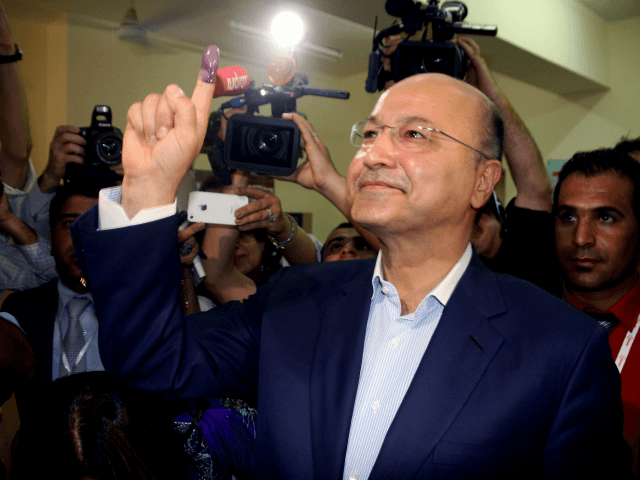Iraqi President Barham Salih on Thursday threatened to resign rather than appoint Asaad al-Edani, currently the governor of Basra, as prime minister. Salih said Edani, who is supported by Iran’s allies in the Iraqi parliament, would be unacceptable to the huge numbers of Iraqis protesting Tehran’s influence in Baghdad.
“Out of my desire to stop blood and maintain peace, and with due respect to Asaad al-Edani, I refuse to nominate him. Therefore I put my willingness to resign the post of president to members of parliament so that they decide as representatives of the people what they see fit,” said Salih, acknowledging that under the Iraqi system he does not have the power to block Edani’s appointment without resigning.
Salih was not making an idle threat. Reuters quoted sources in the presidential office on Thursday who said Salih promptly departed for his hometown in the Kurdish Autonomous Region with the intention of addressing the nation from there. As of Friday morning, Salih had not formally resigned his post or made any dramatic statements to the Iraqi public.
Salih’s rejection of Edani enraged the pro-Iranian Fatah bloc in parliament and Iran’s militia proxies in Iraq. The Shiite militia group Kataib Hezbollah denounced Salih’s actions as “suspicions” and accused him of violating the Iraqi constitution by “refusing to carry out his duties by naming the person who was chosen by the parliament’s largest bloc.”
“We know that he is carrying out an American will that aims to pull the country toward chaos,” Kataib Hezbollah sneered, declaring that it will never accept any candidate for prime minister who is “known to be an agent of the Americans.”
An ominous sign of deepening divisions in Iraq arrived on Friday when the country’s top Shiite cleric, Grand Ayatollah Ali al-Sistani, chose not to deliver his customary Friday sermon. This was taken as a sign Sistani knows deep trouble is brewing and wished to stay out of the battle over prime minister candidates.
The previous prime minister, Adel Abdul Mahdi, technically resigned last month but is still performing most of his official duties until his replacement is confirmed.
In addition to rejecting Iranian influence, the protesters view most of Iraq’s political class as hopelessly corrupt and want an outsider for prime minister, ideally someone with no ties to Islamists, militias, or Tehran. Since the protesters lack central organization, they have not been able to put forward a candidate of their own.
The Iraqi parliament passed an electoral law on Tuesday that would theoretically make it easier for independent candidates to win seats, a reform that was strongly demanded by protesters. In essence, under the new law voters will choose individual members of parliament during elections, rather than voting for lists put together by party leadership. Supporters of the law hailed it as a vital step in fighting corruption, although it will clearly take some time for its effects on the legislature to be felt.

COMMENTS
Please let us know if you're having issues with commenting.